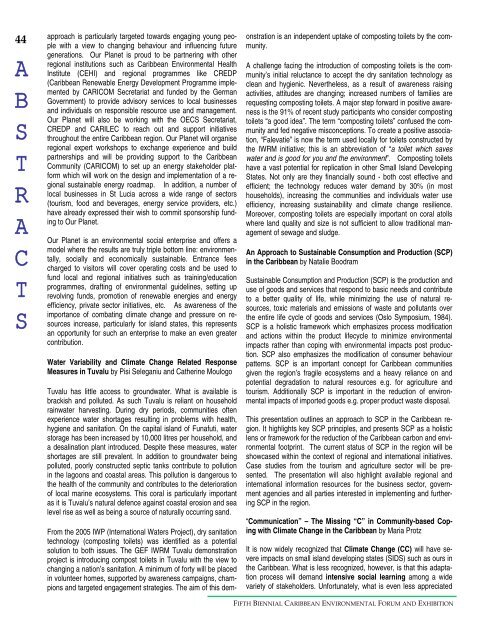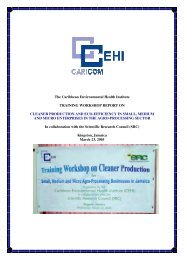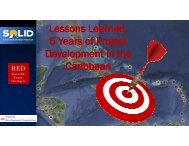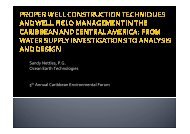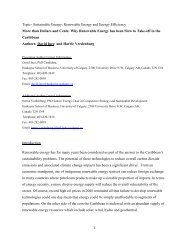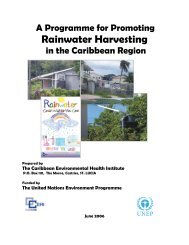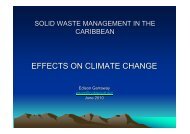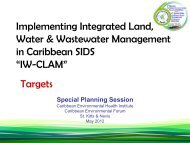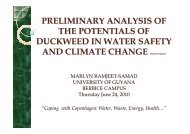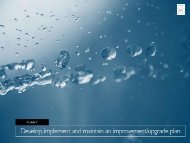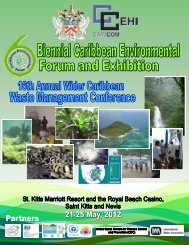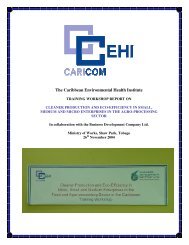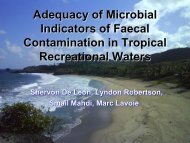conference magazine - Caribbean Environmental Health Institute
conference magazine - Caribbean Environmental Health Institute
conference magazine - Caribbean Environmental Health Institute
Create successful ePaper yourself
Turn your PDF publications into a flip-book with our unique Google optimized e-Paper software.
44<br />
approach is particularly targeted towards engaging young people<br />
with a view to changing behaviour and influencing future<br />
generations. Our Planet is proud to be partnering with other<br />
regional institutions such as <strong>Caribbean</strong> <strong>Environmental</strong> <strong>Health</strong><br />
A<br />
B<br />
S<br />
T<br />
R<br />
A<br />
C<br />
T<br />
S<br />
<strong>Institute</strong> (CEHI) and regional programmes like CREDP<br />
(<strong>Caribbean</strong> Renewable Energy Development Programme implemented<br />
by CARICOM Secretariat and funded by the German<br />
Government) to provide advisory services to local businesses<br />
and individuals on responsible resource use and management.<br />
Our Planet will also be working with the OECS Secretariat,<br />
CREDP and CARILEC to reach out and support initiatives<br />
throughout the entire <strong>Caribbean</strong> region. Our Planet will organise<br />
regional expert workshops to exchange experience and build<br />
partnerships and will be providing support to the <strong>Caribbean</strong><br />
Community (CARICOM) to set up an energy stakeholder platform<br />
which will work on the design and implementation of a regional<br />
sustainable energy roadmap. In addition, a number of<br />
local businesses in St Lucia across a wide range of sectors<br />
(tourism, food and beverages, energy service providers, etc.)<br />
have already expressed their wish to commit sponsorship funding<br />
to Our Planet.<br />
Our Planet is an environmental social enterprise and offers a<br />
model where the results are truly triple bottom line: environmentally,<br />
socially and economically sustainable. Entrance fees<br />
charged to visitors will cover operating costs and be used to<br />
fund local and regional initiatives such as training/education<br />
programmes, drafting of environmental guidelines, setting up<br />
revolving funds, promotion of renewable energies and energy<br />
efficiency, private sector initiatives, etc. As awareness of the<br />
importance of combating climate change and pressure on resources<br />
increase, particularly for island states, this represents<br />
an opportunity for such an enterprise to make an even greater<br />
contribution.<br />
Water Variability and Climate Change Related Response<br />
Measures in Tuvalu by Pisi Seleganiu and Catherine Moulogo<br />
Tuvalu has little access to groundwater. What is available is<br />
brackish and polluted. As such Tuvalu is reliant on household<br />
rainwater harvesting. During dry periods, communities often<br />
experience water shortages resulting in problems with health,<br />
hygiene and sanitation. On the capital island of Funafuti, water<br />
storage has been increased by 10,000 litres per household, and<br />
a desalination plant introduced. Despite these measures, water<br />
shortages are still prevalent. In addition to groundwater being<br />
polluted, poorly constructed septic tanks contribute to pollution<br />
in the lagoons and coastal areas. This pollution is dangerous to<br />
the health of the community and contributes to the deterioration<br />
of local marine ecosystems. This coral is particularly important<br />
as it is Tuvalu’s natural defence against coastal erosion and sea<br />
level rise as well as being a source of naturally occurring sand.<br />
From the 2005 IWP (International Waters Project), dry sanitation<br />
technology (composting toilets) was identified as a potential<br />
solution to both issues. The GEF IWRM Tuvalu demonstration<br />
project is introducing compost toilets in Tuvalu with the view to<br />
changing a nation’s sanitation. A minimum of forty will be placed<br />
in volunteer homes, supported by awareness campaigns, champions<br />
and targeted engagement strategies. The aim of this demonstration<br />
is an independent uptake of composting toilets by the community.<br />
A challenge facing the introduction of composting toilets is the community’s<br />
initial reluctance to accept the dry sanitation technology as<br />
clean and hygienic. Nevertheless, as a result of awareness raising<br />
activities, attitudes are changing; increased numbers of families are<br />
requesting composting toilets. A major step forward in positive awareness<br />
is the 91% of recent study participants who consider composting<br />
toilets “a good idea”. The term “composting toilets” confused the community<br />
and fed negative misconceptions. To create a positive association,<br />
“Falevatie” is now the term used locally for toilets constructed by<br />
the IWRM initiative; this is an abbreviation of “a toilet which saves<br />
water and is good for you and the environment”. Composting toilets<br />
have a vast potential for replication in other Small Island Developing<br />
States. Not only are they financially sound - both cost effective and<br />
efficient; the technology reduces water demand by 30% (in most<br />
households), increasing the communities and individuals water use<br />
efficiency, increasing sustainability and climate change resilience.<br />
Moreover, composting toilets are especially important on coral atolls<br />
where land quality and size is not sufficient to allow traditional management<br />
of sewage and sludge.<br />
An Approach to Sustainable Consumption and Production (SCP)<br />
in the <strong>Caribbean</strong> by Natalie Boodram<br />
Sustainable Consumption and Production (SCP) is the production and<br />
use of goods and services that respond to basic needs and contribute<br />
to a better quality of life, while minimizing the use of natural resources,<br />
toxic materials and emissions of waste and pollutants over<br />
the entire life cycle of goods and services (Oslo Symposium, 1984).<br />
SCP is a holistic framework which emphasizes process modification<br />
and actions within the product lifecycle to minimize environmental<br />
impacts rather than coping with environmental impacts post production.<br />
SCP also emphasizes the modification of consumer behaviour<br />
patterns. SCP is an important concept for <strong>Caribbean</strong> communities<br />
given the region’s fragile ecosystems and a heavy reliance on and<br />
potential degradation to natural resources e.g. for agriculture and<br />
tourism. Additionally SCP is important in the reduction of environmental<br />
impacts of imported goods e.g. proper product waste disposal.<br />
This presentation outlines an approach to SCP in the <strong>Caribbean</strong> region.<br />
It highlights key SCP principles, and presents SCP as a holistic<br />
lens or framework for the reduction of the <strong>Caribbean</strong> carbon and environmental<br />
footprint. The current status of SCP in the region will be<br />
showcased within the context of regional and international initiatives.<br />
Case studies from the tourism and agriculture sector will be presented.<br />
The presentation will also highlight available regional and<br />
international information resources for the business sector, government<br />
agencies and all parties interested in implementing and furthering<br />
SCP in the region.<br />
“Communication” – The Missing “C” in Community-based Coping<br />
with Climate Change in the <strong>Caribbean</strong> by Maria Protz<br />
It is now widely recognized that Climate Change (CC) will have severe<br />
impacts on small island developing states (SIDS) such as ours in<br />
the <strong>Caribbean</strong>. What is less recognized, however, is that this adaptation<br />
process will demand intensive social learning among a wide<br />
variety of stakeholders. Unfortunately, what is even less appreciated<br />
FIFTH BIENNIAL CARIBBEAN ENVIRONMENTAL FORUM AND EXHIBITION


